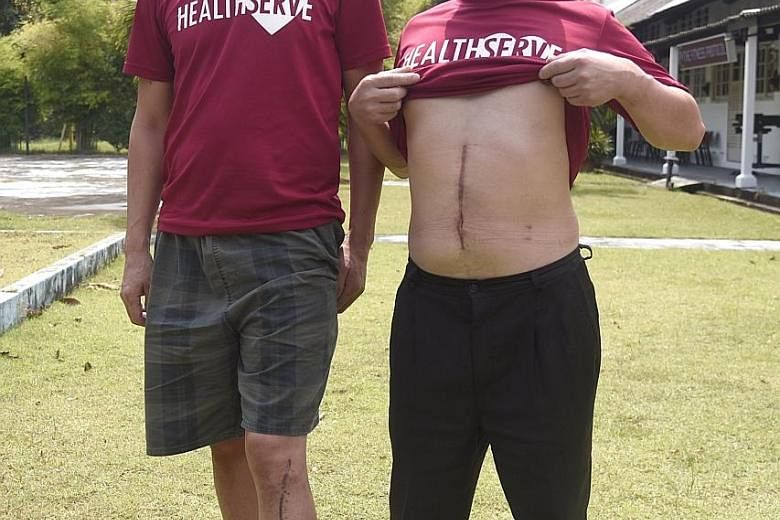Carpenter Zhao Lian Wei had no idea what a spleen was until he fell three storeys at work and ruptured his own.
The 42-year-old from China had been working on scaffolding at a construction site in June when a plank above him came loose and struck him.
Mr Zhao lost his balance and fell, breaking his left wrist and rupturing his spleen, which caused internal bleeding.
What happened next was a haze of pain and nausea, he says. His supervisor took him to three different hospitals. He kept passing out in the toilet. He was parched, but every time he tried to drink water, he vomited.
"They told me I had to go for surgery," he says in Mandarin. "I was terrified. I had never had surgery before. They said, 'we need to take out your spleen.' I didn't even know what a spleen was."
He was eventually operated on and warded for eight days at Tan Tock Seng Hospital. Since then, he has been unable to work and still has difficulty moving around.
According to Mr Zhao, the scaffolding structure where he worked was shoddily built.
"We did not have lifelines," he adds. "We brought this up to our bosses, but they just told us to be more careful."
He is now stuck in Singapore in limbo on a Special Pass, which is given to foreign workers who have to stay here for an injury compensation claim or salary dispute.
Community clinic HealthServe is helping him with free meals and following up on his case, but Mr Zhao has no idea how much longer he will be in this situation.
Such cases usually take three to six months to process, but can sometimes stretch past a year. Those on Special Passes are not allowed to work, and many depend on non-governmental organisations (NGOs) for food and support.
Mr Zhao has told his family back home about his broken wrist, but not about the missing spleen. "I don't want to stress them out," he says.
A report by the Workplace Safety and Health Institute two weeks ago said there were 284 major injuries in the first half of this year, 4 per cent less than in the same period last year. Major injuries are non-fatal but severe. They include injuries that result in amputation, blindness, or burns with more than 20 days' medical leave.
But Mr Jevon Ng, a social work executive at NGO Humanitarian Organisation for Migration Economics (Home), is concerned the number of injuries could be higher as some employers might not report them to the Manpower Ministry (MOM) to avoid investigations or higher insurance premiums.
Last year, Home saw 170 workers whose injuries went unreported by their employers. These ranged from a cut on the thumb to a neck fracture, which would constitute a major injury.
HealthServe communications manager Nhaca Le Schulze says: "The economy has gone sour this year, and workplace safety can be expensive. So companies trying to finish their projects quickly will cut corners."
Construction worker Qiu Lin Min, 42, broke his left leg in February after the contractor he was working for pushed him to meet a deadline. Mr Qiu, who is from China, was removing formwork panels used to create concrete walls when one of the panels fell on him.
It required more than one person to support the heavy panels, he says, but the rest of his team were too busy with other tasks to help.
"The boss kept rushing us, saying it was very urgent. That was why we had to work even on Sunday, our day off. There was not enough manpower and not enough time."
Mr Qiu, who is also on a Special Pass, has been waiting for seven months for his claim to be processed. "I've already been here too long," he says.
Doctors told him he needs to undergo another operation on his leg. It would cost $9,000, which he cannot afford.
He is worried about his wife and three school-going children, aged 11 to 15, who no longer have a source of income now that he cannot work. "I want to be with my family. I want to go home."
Olivia Ho

